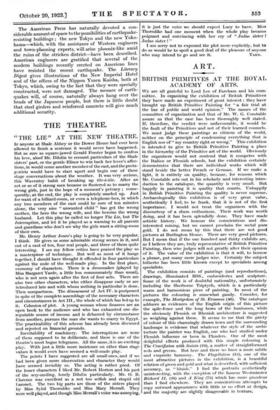THE THEATRE.
" THE LIE " AT THE NEW THEATRE.
IF anyone at Shale Abbey or the Dower House had ever been allowed to finish a sentence it would never have happened. But as sure as square-jawed Gerald Forster began to confess his love, aloof Mr. Dibdin to recount particulars of the Shale sisters' past, or the gentle Elinor to win back her lover's affec- tions, in would come another member of the cast, and the prota- gonists would have to start apart and begin one of those stage conversations about the weather. It was very serious, this Waventry habit of breaking up igte-a-tile. After an act or so of it strong men became so flustered as to marry the wrong girls, just in the hope of a moment's privacy ; conse- quently, at the end, the play is completely snarled up. Just for want of a billiard-room, or even a telephone-box, in which any two members of the cast could be sure of ten minutes alone, the very nice " unwanted child " has got the wrong mother, the hero the wrong wife, and the heroine the wrong husband. Let this play be called no longer The Lie, but The Interruption, and let it be played as a warning to all parents and guardians who don't see why the girls want a sitting-room of their own.
Mr. Henry Arthur Jones's play is going to be very popular, I think. He gives us some admirable strong scenes in it, and out of a cast of ten, four real people, and three of them quite interesting. I see my fellow critics have praised the play as a masterpiece of technique. But well as most of it hangs together, I should have thought it offended in four particulars against the code of the well-made play. In the first place, economy of characters. There is a dressmaker (played by Miss Margaret Yarde, a little less consummately than usual), who is not seen again after the first of four acts. There are also two other characters, who either disappear early or are introduced late and with whom nothing in particular is done. Then compactness. The denouement of Act IV. is postponed in spite of the complete assemblage of the necessary characters and circumstances in Act III., the whole of which has led up to it. Cohesion of plot. A young woman whose finances are an open book to the audience and who has exhausted one dis- reputable source of income and is debarred by circumstance from another, pursues the man she wants to marry to Egypt. The practicability of this scheme has already been discussed and rejected on financial grounds.
Inevitability of machinery. The interruptions are none ,of them supposed to be deliberate, and there is one of the theatre's most bogus telegrams. All the same, it is an exciting play. With just a little more insistence on other than stage values it would even have seemed a well-made play.
The points I have suggested are all small ones, and if we had been given more observation and character they would Jiave seemed invisibly so. The acting is rather good. Of the lesser characters I liked Mr. Robert Horton and his part of the wry-smiling, lonely Dibdin particularly. Mr. 0. B. Clarence was excellent as a not too selfish and stupid old haronet. The two big parts are those of the sisters played by Miss Sybil Thorndike and Miss Mary Merrall. They were well played, and though Miss Merrall's voice was annoying,
it is just the voice we should expect Lucy to have. Miss Thorndike had one moment when the whole play became poignant and convincing with her cry of " Judas sister Judas sister ! "
I am sorry not to expound the plot more explicitly, but to do so would be to spoil a good deal of the pleasure of anyone who may intend to go and see it. TARN.










































 Previous page
Previous page